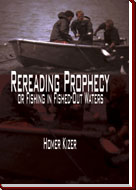
In Rereading Prophecy, Homer Kizer demystifies the beasts the prophet Daniel and the apostle John saw in visions. Relying upon his training as a literary critic and his experience as a novelist, he superimposes one little horn on the other and concludes that Protestantism's Roman bias cannot be supported from the biblical text.
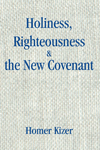
Transcending denominational doctrines and traditional readings of prophecy, this book deconstructs Christianity to show that its foundational constructs require believers to always do what is right whenever decisions are made.
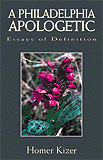
In essays stretching from his induction into the Church of God to whether God trusts us to get it right, to where he was at spiritually when drafted to do this endtime work, Homer Kizer reinjects predestination and legalism into 21st-Century theological discussions with his provocative assertions that hell isn´t now filled with unBelievers, and that salvation isn´t now available to everyone.
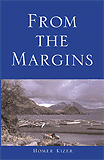
Excerpt from a review by Professor Ralph Baergen, Idaho State University (review published on amazon.com). Anyone who enjoys stories of hunting and fishing will find much to love in this book. Kizer has been over the mountain; he has much to say and he tells his tales well. He tells of the storm that pinned him down in the back country for days; of the shake-down cruise of a fishing boat that didn't end up where it was supposed to; of coaxing a reluctant horse through freezing surf as the tide rises.
There are also stories here of raising three daughters. He describes the time they brought home a leech in a jar and kept it as a pet, and of their excitement as they learned to hunt. These stories, mingled with memories of his own childhood, are tender and real. And they are told in a way that makes clear that life and family and growing up are things that fit perfectly into the wildness of Alaskan islands.
Although the author cares passionately about the natural world, he does not fit the usual environmentalist pattern. For instance, his anger and bitterness at Georgia-Pacific's decision to clear-cut right to the edges of streams (thus destroying ecosystems) sits alongside the fact that he himself worked for a logging company. Rather than seeing humans as foreign bodies that cannot help infecting the ecosystems around us, he sees us as a natural part of the picture.
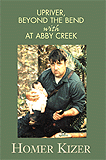
UPRIVER is a collection of poetry that defies orthodoxy. Drawn from the author's experiences in Alaska, Oregon and Idaho, these poems echo his life in a voice of long rural residency. They truly come from the upper stretches of the river of life, those runs and drifts beyond the reach of travel writers.
The first 24 stanzas of ABBY CREEK's 110 stanzas were published in American Nature Writing 1998 (Sierra Club Books), edited by John A. Murray. This is the first time the complete text of the poem, nominated for a Pushcart Award, has been available.
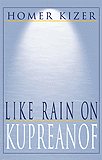
The power of words and of that mystical concept best called story maintains harmony in the mostly-Native world of Port Adams, the larger of the two cannery towns on Cooks´ Island, Alaska. But years ago, Jacob Chickenof, a successful fisherman, a highliner, a powerful toion, carelessly spoke harmful words that have festered until the spirit woman who holds them has her chance for revenge. Her revenge even takes the life of her son. In the end, the world can only be righted through story. Jacob sings his death song, and John manufactures evidence until his father undertakes to teach him the old ways.
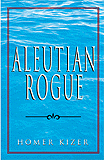
On the edge of a two-sided world, Jay Shoulders, conceived but never born, wrestles with his wild Rogue roots and memories of a spirit lost somewhere in Laos. A fisherman at Unalaska, Alaska, Jay offers refuge to a stranded foreign fleet Observer and to a petty drug dealer, thereby setting into motion his flight to Kodiak, Kenai, Ketchikan and on into British Columbia before he returns, alone. But as he stays awake day after day while sailing up the Gulf of Alaska, he sees visions of a future son already beginning to grow, visions that stir his Native roots.

When GRU sends an agent to Alaska to rectify an active measure gone awry, they didn't expect the commercial fisherman Jay Shoulders to turn their proval into a struggle of technology versus nature. Using her U.N. cover, the GRU agent must overtake Shoulders who flees from Dutch Harbor days before she arrives. She must unravel truth as she juggles death and deception, and Jay Shoulders, the Aleutian Rogue, is her judge, his rifle his gavel.
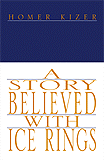
A Story Believed * In Idaho Falls, deputy Jim Crapo doesn't know who to believe when confronted with stories of hanta virus used as a bio?weapon and of methane?consuming microbes. He has to choose either Site officials or a missing scientist--he can't believe one and doesn't want to believe the other. But belief is about faith. He at least was a man of faith.
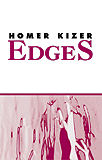
**
Kell Harder came to Port Adams, Alaska, to photograph eagles. He stayed to regain the success he had experienced in his youth. What he finds is that change can come suddenly if he really wants to change his prospects. When Kell takes a photograph of a Russian trawler, the image of a girl mysteriously appears on his negatives. He convinces himself that he just missed seeing the girl when he shot the photographs, but when his negatives of the girl on the trawler disappear after he refuses to sell them, he isn’t sure what to think. He has only a print of the girl. But after Kell sends the print to Anchorage’s News Miner, the daily newspaper’s staff photographers are unable to reproduce the image of the girl. They want to know what has he done to the print--and Kell has a decision he can’t put off making.
[ Archive ]